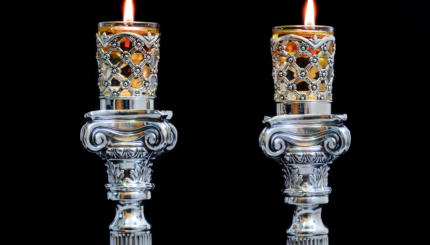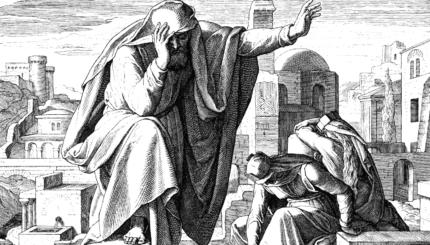In its instructions for observing Yom Kippur, the Torah specifies that we are to “afflict our souls.” After searching scripture and Mishnah in order to determine what affliction means, the rabbis identified five activities from which we abstain on the most solemn, but not mournful (despite the posture of many Jews, particularly of Eastern European background) day of the year. The purpose is not to punish ourselves but to gain control over our bodies and their potentially harmful appetites, which can become ends in themselves: Rambam (Maimonides) describes the prohibitions of Yom Kippur as “resting,” as if not doing them were relief from ordeals. While not engaging in our normal daily concerns and pleasures, we become more conscious of how our physical urges so often lead us into trouble.
In the Talmud‘s terms, for a brief time we elevate ourselves to the status of angels, who have no corporeal needs and whose sole role in the universe is to serve God. (The rabbis also explain that the things we abstain from are all those that make the soul comfortable in the body. By engaging in activities that make it uncomfortable, the soul is more likely to rise up from the body, taking us to a higher spiritual plane.)
Fasting
Derived directly from the Torah, abstaining from eating and drinking from before sundown until after the following sunset is probably the greatest test of self-control during this holiday. How are we supposed to accept the promulgated notion that fasting frees us to worship when hunger pangs and distaste in a parched mouth create strong distractions to concentration on lofty spiritual thoughts?
The abstention in and of itself cannot create a sense of spirituality. The idea is to be able to refrain from giving in to our impulses. We prove to ourselves that we can control our bodies in the extreme; under normal circumstances we should certainly be able to prevent our desires from leading into damaging excesses. Allowing the body to rid itself of the toxins eating produces mirrors our efforts on this day to purge ourselves of the impurities of unhealthy thoughts and deeds.

Help us keep Jewish knowledge accessible to millions of people around the world.
Your donation to My Jewish Learning fuels endless journeys of Jewish discovery. With your help, My Jewish Learning can continue to provide nonstop opportunities for learning, connection and growth.
Of course, in the extreme, the restriction of food and water results in death. On Yom Kippur, this concept is significant in two ways. First, as on Rosh Hashanah, the act of standing to be judged in a sense entails facing death, for we are waiting to see what the verdict in our trial will be, whether or not we will be written in the “Book of Life.” By denying ourselves material sustenance, we symbolically engage in self‑sacrifice, a recognition that we deserve to be punished. (The weight‑conscious will take heart in the fact that fasting reduces the body’s fat content.) That innocent animals lost their lives for human wrongdoing (their fat was burned at the altar) should have made people aware of their actions. Today it’s not animals, but what, we should ask ourselves, is being sacrificed when we err?
Experiencing hunger that we know is temporary should also encourage us to do something for those who suffer from lack of food. This is the real purpose of the fast, as Isaiah explains in the day’s prophetic reading. A problem since biblical times, it has not abated yet, with recurring wars, famines, and other natural disasters leaving millions to die of starvation. When we resume feeding our bodies, we are revived and, as people who have experienced near death attest, feel like we are starting over. When we do so, it should be with our priorities in order.
Since Torah stipulates that the fast begins on the ninth day, but we are to deny ourselves only on the 10th, it is understood that the fast begins before sundown and concludes the next day at nightfall.
To revive themselves during the long hours without food, worshippers sometimes sniff smelling salts (in former times, tobacco or snuff), spices, flowers, or a clove‑filled etrog (citron) prepared after the previous Sukkot. Among the religious, spices are used this way just to give them the opportunity to say a berakhah [blessing]. (The rabbis instructed that 100 benedictions be said daily, which is more difficult on Yom Kippur because of its restrictions.) If you smell spices, the blessing to be said is: Blessed are You, Lord our God, King of the Universe, Who creates species of fragrance.
Sexual Relations
The normal and healthy drive, encouraged on Shabbat because it is an act seen to involve God and assist Him in ongoing creation, is prohibited on Yom Kippur. Again, it is an appetite whose satisfaction can lead one into sin.
Washing
Cleansing oneself for pleasure or comfort is prohibited. Observant Jews do not shower, bathe, or wash their hands or faces, unless they are soiled with mud. The focus of this day is on internal, rather than external, cleanliness. You should not think you are rid of soil just because you have applied soap and water to your skin.
Anointing
The application of oil to the body was once done regularly, particularly after bathing and was part of the cleansing process. Today, anointing generally refers to the use of face and hand creams, which on Yom Kippur are not to be applied except for medicinal purposes. As for the prohibition against washing, thoughts should be directed to what needs to be cleaned out from the inside.
Wearing Leather Shoes
You may notice a lot of people wearing sneakers, particularly the basic canvas and rubber models, to synagogue. It is not for comfort, although they certainly function that way with all the standing we do during the services. Wearing shoes (sandals in biblical days) of leather was forbidden in holy places, as we learned from Moses’ experience before the Burning Bush (Exodus 3:5), where he removed his sandals. The Kohanim [priests] removed their shoes when giving the Priestly Benediction in the Temple (as the Kohanim do today when they stand before the Ark in front of the congregation for the dukhan service, during which they make the blessing). Since the day of Yom Kippur entails a reliving of the Temple experience, we forego our leather shoes as well.
(As usual, the rabbis offer another reason: After Adam and Eve’s sin, the earth, which was supposed to have been holy ground, became contaminated. We normally wear shoes to keep from having direct contact with the defiled ground. But on Yom Kippur, when we make atonement with God and focus on attaining the purity of Creation, the earth is holy, and so we don’t have to separate ourselves from it.)
On the physical level, leather shoes protect the feet, providing comfort, while footwear of other materials or going barefoot does not. On the Day of Atonement, we forego bodily pleasure. Because of their comfort, and also their expense, even in biblical times leather shoes were considered a luxury (Song of Songs 7:2) and thought to contribute to a feeling of pride and haughtiness in the wearer. Since Yom Kippur, and the entire Ten Days of Repentance, are designed to produce feelings of humility, wearing leather shoes would interfere with one’s proper frame of mind. (Despite the admonition of overzealous rabbis, the prohibition is specifically for leather shoes whether the top or sole is of leather-‑and not other items made from the skins of animals. Coats, hats, watchbands, and so on are all permissible.)
Reprinted with permission from Celebrate!: The Complete Jewish Holidays Handbook, published by Jason Aronson Inc.
etrog
Pronounced: ETT-rahg, Origin: Hebrew, a citron, or large yellow citrus fruit that is one of four species (the others are willow, myrtle and palm) shaken together as a ritual during the holiday of Sukkot.

Help us keep Jewish knowledge accessible to millions of people around the world.
Your donation to My Jewish Learning fuels endless journeys of Jewish discovery. With your help, My Jewish Learning can continue to provide nonstop opportunities for learning, connection and growth.
Shabbat
Pronounced: shuh-BAHT or shah-BAHT, Origin: Hebrew, the Sabbath, from sundown Friday to sundown Saturday.

Help us keep Jewish knowledge accessible to millions of people around the world.
Your donation to My Jewish Learning fuels endless journeys of Jewish discovery. With your help, My Jewish Learning can continue to provide nonstop opportunities for learning, connection and growth.
Torah
Pronunced: TORE-uh, Origin: Hebrew, the Five Books of Moses.

Help us keep Jewish knowledge accessible to millions of people around the world.
Your donation to My Jewish Learning fuels endless journeys of Jewish discovery. With your help, My Jewish Learning can continue to provide nonstop opportunities for learning, connection and growth.
Yom Kippur
Pronounced: yohm KIPP-er, also yohm kee-PORE, Origin: Hebrew, The Day of Atonement, the holiest day on the Jewish calendar and, with Rosh Hashanah, one of the High Holidays.

Help us keep Jewish knowledge accessible to millions of people around the world.
Your donation to My Jewish Learning fuels endless journeys of Jewish discovery. With your help, My Jewish Learning can continue to provide nonstop opportunities for learning, connection and growth.


